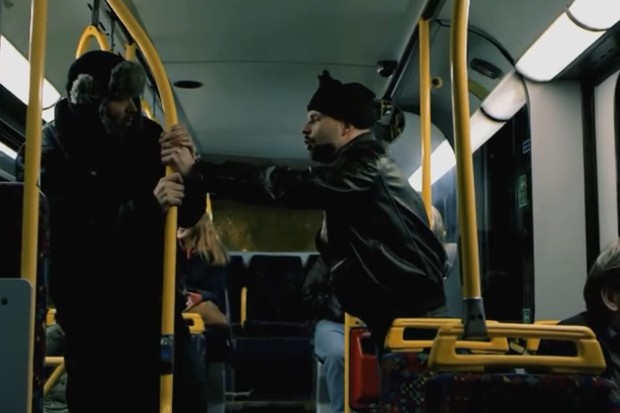Night Bus: oltre il realismo in un viaggio notturno attraverso Londra
- In inglese: Il Festival di Londra accoglie l'opera prima di Simon Baker, che presenta una moltitudine di personaggi che interagiscono nella notte londinese

Questo articolo è disponibile in inglese.
Simon Baker’s debut film, Night Bus [+leggi anche:
trailer
scheda film], has just premiered at the 58th BFI London Film Festival, and it is quite a different beast from your average piece of British neo-realism. Certainly, the film has elements that could almost seem mimetic, but right from the first bus stop, we know we’re in for something different – something as poetic as it is studied. And this mix of urban romanticism and tangible realism feels so playful that it is irresistibly fresh.
The poetic images we see perfectly capture London’s real night-time beauty, when its streets have that special rain-glistened sheen. Throughout, neon lights incandescently hang like chains of jewels, exquisitely reflecting across obscure, wet pavements, spreading like white ink over black blotting paper. Nevertheless, our journey to Leytonstonenever ceases to feel real.
Despite the film’s classy, jazzy soundtrack and its chaotic, jazz-like structure, our twanging, jolting progression through a series of loosely connected events never stops feeling like every late-night public transport trip you’ve ever made. Indeed, the night bus moves through the night like a representative capsule of social dysfunction, and one that could have taken place anywhere from Dover to Dundee.
A large part of why it all seems so familiar is because it is: people really are that obnoxious on a Friday night. But Night Bus’s successhas a lot more to do with its skilful observation of London’s social types today. A collection of very normal weirdos have been microscopically observed, and then lovingly recreated. But the mannerisms are never recreated in a way that is clichéd or condescending.
In this sense, this film follows proudly in Dickens’ restless footsteps (whose skill for respectfully immortalising London’s plethora of social types is legendary). Indeed, this film does have something of Dickens’ first book, Sketches by Boz. Like that collection of literary snapshots, Night Bus moves through the many ebbing and flowing social ebullitions of London life with similar grace.
But the night bus also gains an almost biblical feel, becoming a sort of portable Tower of Babel. Languages and accents play against each other in an almost jarring, syncopated way, but the real Babel-esque failure of communication comes from the manifold different perspectives we see. Like a cubist painting, Night Bus stages and restages the same journey from many different points of view. In this way, the feature panders to that itching fascination we all have: to know more about the people we fleetingly bump into.
It is this collision of different world views that is really brilliant. Rich and poor, narrow-minded, open-minded, troubled or free – all kinds of human experiences sit cheek by jowl. The anger and conflict, and merriment or jubilation caused by these impressively confined collisions make for one compelling ride right to the heart of several problems (and exciting cultural polarities) that exist in Britain today.
These differences often descend into a range of malicious responses, creating that distinctly awkward British feel for viewers. Everything uneasily unfolds before us – mockery, animosity, manipulation – tensions that the bus’s world of safety warnings is powerless to override. As is always the case, though, many of these tense British hostilities reveal themselves to be charming, funny expressions of affection or familiarity. And this film’s edgy, streetwise wit is pretty funny.
But, like all good British humour, Night Bus is far too complex and dark to sit neatly under an umbrella term like “comedy”. The film at least produces something more tragi-comic. The end experience is therefore also deep and pensive. By the time the credits roll, we have learnt that laughter and enjoyment can come from trying to understand others – which, to completely undermine an earlier point, is sort of a realist enterprise…
But Baker has gone beyond realism, and tapped right into the heart of what British cinema is today: a loosely connected movement that will support the diversity of the UK’s cityscapes; and it will do so in both realist and carnivalesque ways. For that reason, Night Bus really is a great film, and anybody who doesn’t agree can meet me on the N55 for slurred squabbles and clumsy punches.
(Tradotto dall'inglese)
Ti è piaciuto questo articolo? Iscriviti alla nostra newsletter per ricevere altri articoli direttamente nella tua casella di posta.

















